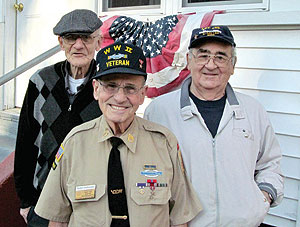
Hawthorne Street residents (Left to right) Larry Bolt, Ralph De Amato, and Julius Bortone all served their country during World War II. – Photo by Elizabeth Sheeran
WWII veterans still going strong
*
By Elizabeth Sheeran
More than one in ten Somerville residents has served in the military, and one reason for the city’s substantial roster of veterans can be found in its history.
In the 1930s, Somerville’s population was at its peak, and its triple-deckers teamed with large families. When the U.S. entered World War II, many a Somerville mother watched as two, three or even more sons headed off to the fight. Raised during the Great Depression, these soldiers prevailed in the greatest war in history. And after setting a high standard for perseverance and service, they went on to raise the bar for longevity, so that seven decades on, there are a surprising number of World War II veterans still among us.
One small stretch of Hawthorne Street, just off of Davis Square, boasts not one but three such men living within an area of less than half a block. Ralph DeAmato, Larry Bolt and Julius Bortone all served their country on foreign shores in a time without emails to keep in touch with loved ones, or flights to bring you home quickly. A time when once you were in the fight you stayed in the fight until you couldn’t fight any more, or the war was over.
“We were there ‘til it’s over over there, like the song,” said DeAmato.
They are the veteran veterans. The senior statesmen among many heroes. Yet on Sunday afternoon this week, on a day set aside to honor their service, they would just have soon been talking about victory for a different kind of New England Patriot.
“I didn’t do anything special,” said Bolt. But pressed a little further before returning to watch the football game, he recalled the day he was drafted in 1940. “They said I was going in for a physical. I thought I’d be home for dinner, but then they shipped me off. I got drafted a year before the war even started,” he said.
Bolt, who said he was the first person in Somerville to be drafted, served from 1940 through the end of the war, running B-59 bombers on dangerously low-flying missions. He said his crew was third in line to drop atomic bombs over Japan in 1945, but they were called off when the Japanese surrendered after the first two bombs landed on Hiroshima and Nagasaki. “I was lucky,” said Bolt.
Talk to veterans of that era, and they talk a lot about luck. Bortone, who crisscrossed the English Channel with the amphibious forces 64 times during the Normandy invasion on D-Day, and later went on to serve all over the Pacific, said he felt lucky to be in the Navy, because the infantry had tougher conditions. “I saw it firsthand. These guys went through Hell,” said Bortone.
DeAmato, an infantryman who fought his way across Europe in foxholes and survived the punishing Battle of the Bulge, only to be wounded three days after crossing the Rhine in Germany, said he felt lucky that the Japanese surrender came just as he was in transit to be redeployed from Europe to the Pacific, so he went home instead.
Like all veterans, they came home mindful of the ones who didn’t, and grateful for the sacrifices of their fellow soldiers. But the fact that these men have been friends for well over half a century has more to do with their having raised 14 children within spitting distance of each other, than it does with their shared wartime experience. After all, for their generation military service was the norm, not the exception.
Bortone laughs when asked if anyone else in his family served. “I had five brothers and they were all in the service. Every one of them,” he said.
“Don’t forget, there were 16 million of us,” said DeAmato, who was one of four brothers who served. “When we got out of the War, we were just interested in starting our life over. We never talked about it.”
These veterans may not see themselves as exceptional. But that doesn’t stop them from being role models. “I’ve lived on this street for 25 years, and I’ve learned so much from these men, said DeAmato’s son-in-law Dale Estey, himself a veteran who served in the Middle East during the Iran hostage crisis. He said he has come to admire the sheer toughness of these men who have lived through so much, and yet still don’t buy anything on credit.
“Everybody could learn from the three of them,” said Estey. “They came off the Depression. They already went through a hard time like nobody here would ever go through and then they got tossed into a war.”
And Estey is inspired by how these men kept giving back to their communities well into their eighties, after already having given so much to their country. “They love their country and they love service,” said Estey. “I wish we all loved our country the way they do. It’s hard to find.”
DeAmato, who continues to pay regular visits to the Soldiers’ Home in Chelsea, said it’s especially important to support veterans’ organizations, so that returning veterans get the help they need. He said he benefits from a monthly post-trauma support group at the Veterans Administration, because nearly 70 years later, he still has nightmares about the War.
He feels this country has been good to him, and he’s especially grateful that there is finally a national World War II Memorial in Washington, D.C., which he was able to visit when it opened in 2004. But for all their sacrifice, he and his fellow veterans ask for very little back.
“There are two words veterans like to hear,” said DeAmato, “‘Thank you.’ That’s all you have to say. It means more to them than a medal.”












Reader Comments